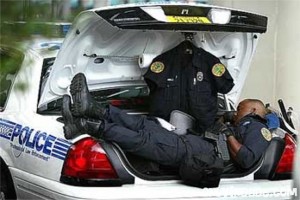 In-Depth Look at the Research
In-Depth Look at the Research
For an in-depth look at this research, read an article published in the Journal of the American Medical Association Exit Notice.
On this page find:
Overview
With ever-changing schedules, overtime, and overnight shifts, it is not surprising that some police officers suffer from sleep disorders. Sleep disorders, which are typically associated with poor health, performance and safety outcomes, are twice as prevalent among police officers compared to the general public - and a new study suggests that they remain largely undiagnosed and untreated.[1]
Research on Sleep Disorders
Over an 18-month period, researchers at Brigham and Women’s Hospital, a teaching affiliate of Harvard Medical School in Boston, gathered data on sleep disorders, health, and performance from almost 5,000 police officers in North America. The data showed that just over 40 percent of police officers screened positive for sleep disorders - almost double the 15 to 20 percent estimated rate of sleep disorders in the general population.
The most common sleep disorder was obstructive sleep apnea, affecting more than one-third of the officers (34 percent or 1,666 of 4,597 respondents). Moderate to severe insomnia came in second (7 percent or 281 of 4,298 respondents), followed by shift work disorder (defined as “excessive wake time sleepiness and insomnia associated with night work,” affecting 5 percent or 269 of 4,597 respondents).
But the potential risks to officers — and the general public — due to fatigue are even more common than these findings suggest. According to the researchers, excessive sleepiness is common among police officers, whether they have sleep disorders or not. In fact, almost half of all participants (46 percent) reported having fallen asleep while driving. Approximately one-quarter (26 percent) reported that this occurs one to two times per month.
Impact on Officer Safety
Officers with sleep disorders had a higher risk of falling asleep while driving, committing an error or safety violation attributable to fatigue, and experiencing uncontrolled anger towards a suspect. These officers were also more likely to report committing a serious administrative error and had a higher rate of absenteeism than those without sleep disorders.
The most common sleep disorder - affecting 34 percent of officers screened - was obstructive sleep apnea (OSA), a condition in which the airway becomes narrowed or blocked during sleep. Excessive sleepiness affected 29 percent and moderate to severe insomnia affected 7 percent of officers surveyed.
Note
[1] Shantha M.W., Laura K. Barger, Steven W. Lockley, Steven A. Shea, Wei Wang, Christopher P. Landrigan, Conor S. O’Brien, Salim Qadri, Jason P. Sullivan, Brian E. Cade, Lawrence J. Epstein, David P. White, and Charles A. Czeisler, “Sleep Disorders, Health, and Safety in Police Officers” Exit Notice, JAMA 306 (2011): 2567-2578.

